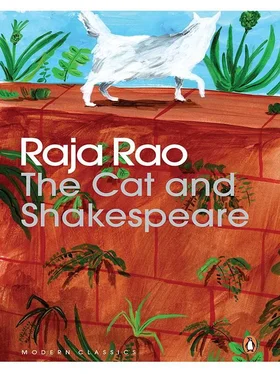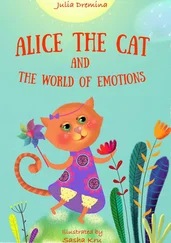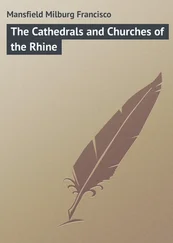Rao Raja - The Cat and Shakespeare
Здесь есть возможность читать онлайн «Rao Raja - The Cat and Shakespeare» весь текст электронной книги совершенно бесплатно (целиком полную версию без сокращений). В некоторых случаях можно слушать аудио, скачать через торрент в формате fb2 и присутствует краткое содержание. Год выпуска: 2014, Издательство: Penguin, Жанр: Современная проза, на английском языке. Описание произведения, (предисловие) а так же отзывы посетителей доступны на портале библиотеки ЛибКат.
- Название:The Cat and Shakespeare
- Автор:
- Издательство:Penguin
- Жанр:
- Год:2014
- ISBN:нет данных
- Рейтинг книги:4 / 5. Голосов: 1
-
Избранное:Добавить в избранное
- Отзывы:
-
Ваша оценка:
- 80
- 1
- 2
- 3
- 4
- 5
The Cat and Shakespeare: краткое содержание, описание и аннотация
Предлагаем к чтению аннотацию, описание, краткое содержание или предисловие (зависит от того, что написал сам автор книги «The Cat and Shakespeare»). Если вы не нашли необходимую информацию о книге — напишите в комментариях, мы постараемся отыскать её.
The Cat and Shakespeare — читать онлайн бесплатно полную книгу (весь текст) целиком
Ниже представлен текст книги, разбитый по страницам. Система сохранения места последней прочитанной страницы, позволяет с удобством читать онлайн бесплатно книгу «The Cat and Shakespeare», без необходимости каждый раз заново искать на чём Вы остановились. Поставьте закладку, и сможете в любой момент перейти на страницу, на которой закончили чтение.
Интервал:
Закладка:
Velayudhan Nair’s wife, when you see her at a cinema, has an array of gold bangles on her hands. She inherited some money from her aunt. We all have aunts; why don’t we inherit? is a pertinent question and Govindan Nair, who is pertinence itself, asked it. He was interested in children, in houses for children, in medicines for spleen that bloats, etc. When one is curious one can know anything. It’s like the kitten seeking the cat, etc. (I use etc. because that is exactly Govindan Nair’s language. It comes from working in offices disinterestedly, he says, does Govindan Nair.)
So, to use his phrase, the cat came out of the bag. It was a big cat and the bag was a gunnysack. It smelled peculiarly of rice. There’s a saying of Kabir they often quoted in the ration shop: On each grain of rice is writ the name of he who’ll eat it. The ration card is the proof. Medicine for spleen is proof of the ration card. The child is proof of his father, said Velayudhan Nair, showing his child to Govindan Nair. ‘My son has no spleen. He has malaria or filaria, I don’t know what it is,’ said Govindan Nair. ‘You must take him to a decent doctor,’ said Velayudhan Nair. ‘Who is your doctor? ‘ asked Govindan Nair. ‘Why, Doctor Velu Pillai, MBBS, MRCP from Edinburgh. Specialist in children’s diseases.’ ‘My son is seven years old. He is neither a child nor a man. So where shall we take him?’ laughed Govindan Nair. ‘Why,’ replied Velayudhan Nair, ‘I have just the fellow for that. You come here tomorrow at five. And we’ll settle it.’
‘Ah, sir, the cat is out of the bag,’ he said, coming to see me that evening. Hitler was winning his wars. The prices went up. The British army poured into India. India sent rice to Persia. Russia attacked the German left flank. Von Boch was hurtling towards Moscow. Von Rundstedt’s armies rushed towards Kiev. The Dnieper Dam was blasted. Paris decreed against Jews. Roosevelt was wiping his spectacles — that was one of the pictures stuck against the wall in our office. We liked Roosevelt because we hated Churchill. We love what we cannot have. When we have it, we have it not, because what it is not, is what we want, and thus on to the wall. The mother cat alone knows. It takes you by the skin of your neck, and takes you to the loft. It alone loves. Sir, do you know love? O Lord, I want to love. I want to love all mankind. Why should there be spleen when in fact there is no malaria? Why don’t children sit in scales and play the game of ration cards? Who plays, Lord, who plays? ‘Give unto me love that I love,’ such was the prayer that went up from across my garden wall to the nowhere.
‘How is Shantha?’ asked Govindan Nair abruptly, as if suddenly he had seen the mother cat with the kitten, and I said: ‘She was asking your wife about a good maternity doctor. Dr Krishna Veni Amma is no good. She is too young. Do you know of one?’
‘Yes,’ he said. ‘I am seeing a child’s doctor tomorrow. I think he will do.’
What is a doctor? One who knows diseases is the simplest definition. One who knows a wound and heals a pain is a doctor.
Five o’clock on any watch (including the clock on the Secretariat) is the same moment all over the world. But not the same hour, for the world is regulated by the watch. Pray, what is a watch? A thing that turns on itself and shows the moon. What is the moon? The thing that turns on itself and (elliptically) goes around the sun. And what is the sun? The sun is a luminary that made the earth — the grasses rise green on the sward; the clouds form; the dawn comes; the cattle go home; man puts manhood into woman and the child is born; the tree shoots into the air, and birds sit on it; houses rise, houses, and our children, when they are born, are well looked after. Eagles circle. That is all due to the sun. And the moon. And the clock on the Secretariat. (If the government did not run, then who would pay whose debt?) So, at five-fifteen, Velayudhan Nair went over to the table of Govindan Nair (and what an ocean of ration cards was there, with cigarette butts, shirt buttons, broom grass for cleaning the ears, sandal paste — on little banana leaves — dry flowers, books — Eletchan and one or two books on Vedanta — and in the drawers would be pencils, razor blades, stitching needles, and pice. To buy a cigarette the pice is easier to give than an anna. Copper makes the waste simpler, and the boss does not mind it as long as it is cheap and he knows you are not making money on ration cards. Two rupees a ration card is the official black-market price, if you want to know. If you have children you can have ten cards. To have ten children is permitted by law. And the doctors have no objection. ‘So we have ten children. Look how well fed I look. My wife has a ruby earring. Look, look at her,’ etc., etc.).
Velayudhan Nair says: ‘Man, we go to the doctor.’ Velayudhan Nair always began every sentence with Man, for he had been to Bombay. In Colaba every De Souza says: Man. This they learned from the P & O ships. And P & O ships touch Plymouth. Do they say ‘Man’ there, one wonders.
‘So, man, we go to the doctor,’ he repeated.
‘Mr Man, I come,’ said Govindan Nair. He sometimes used Mister to show he too could be elegant. He called his son Mr Shridhar. (‘Mr Shridhar, go and get me a chew,’ ‘Mr Shridhar, the thing that father puffs is wanted,’ etc., etc. Mr Shridhar therefore brought the chew tobacco or that which father puffs, according to orders.)
Velayudhan Nair: ‘Man, it is hot.’
Govindan Nair: ‘Mister, it cannot be cold in April.’
Velayudhan Nair (wiping his face): ‘Yes, but we will have to wait at the doctor’s.’
Govindan Nair: ‘Why, is he such a busy man?’
Velayudhan Nair: ‘Busy? He is as busy as he wants to be.’
So we go, said Velayudhan Nair, and Govindan Nair pulled the shirt over his body and there they were going to the doctor. The doctor lived off the main road, before you come to the temple. You know, as you go down after the railway bridge, there are a number of cloth shops. Then if you turn to the right — the first lane after where the policeman stands — you come to a small square.
A pleasant rain began to fall. It was refreshing, this cool shower of the heavens. They went up an ordinary tier of house steps, knocked at a much-knobbed door (more like houses in Madras than here), and they entered. It was a living house, obviously, for there was a bronze swing at the far end of the corridor, in the huge hall, where there were many lights. Perhaps the clouds had made the house dark. Suddenly the sun shone and the lights went off. There were many ladies inside the house. There were also some men.
‘The doctor is a busy man. Let me go and see,’ said Velayudhan Nair, and went towards the swing.
Govindan Nair sat on a sofa and started reading the Cheeranjivi.
Nothing is pleasanter than a doctor’s waiting room. You have the pleasantest thoughts because you know the doctor will say: ‘You have no disease. This is not pneumonia. This is a bad cold. This is not venereal, this is only the British bubo,’ etc.
Before you had time to say Rama Krishna, there he was, Velayudhan Nair. They both entered a huge room, opening on the back yard where a lonely neem tree stood. There were many soldiers there, their hands tattooed; there were government officials in slick clothes; there were merchants and even some Communist leaders (who had just been let out of jail). There were bottles on the table. You could hear women’s voices from the other side of the corridor. How they shrieked or hissed, or you heard them sing. One or two of them came out in high-heeled shoes. Some were smoking and even speaking English. A girl came in — an Anglo-Indian no doubt — and spoke in Tommies’ tongue. The men who came out were adjusting their clothes and pulling their ties, and laughing. Some of them had their hands on their hair, quite thoughtful. Life looked gay and remote and not altogether comfortable. Life is like that. Life is a ration shop. The scale weighs everything according to the ration card. Where is your ration card, Sir? Green, red, or blue?
Читать дальшеИнтервал:
Закладка:
Похожие книги на «The Cat and Shakespeare»
Представляем Вашему вниманию похожие книги на «The Cat and Shakespeare» списком для выбора. Мы отобрали схожую по названию и смыслу литературу в надежде предоставить читателям больше вариантов отыскать новые, интересные, ещё непрочитанные произведения.
Обсуждение, отзывы о книге «The Cat and Shakespeare» и просто собственные мнения читателей. Оставьте ваши комментарии, напишите, что Вы думаете о произведении, его смысле или главных героях. Укажите что конкретно понравилось, а что нет, и почему Вы так считаете.












